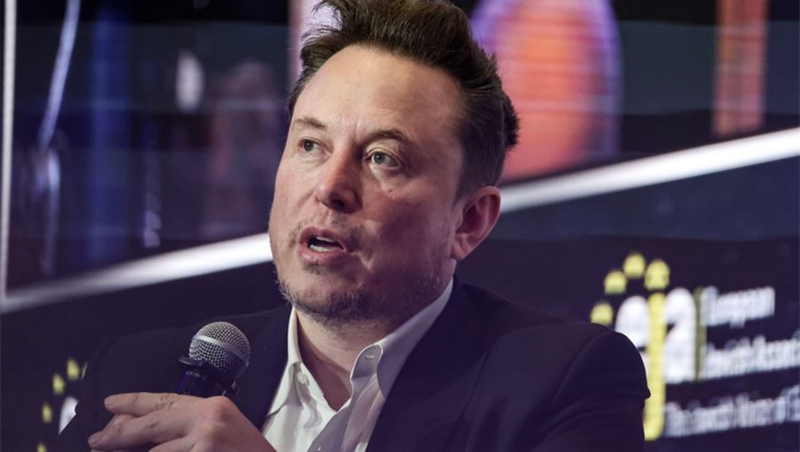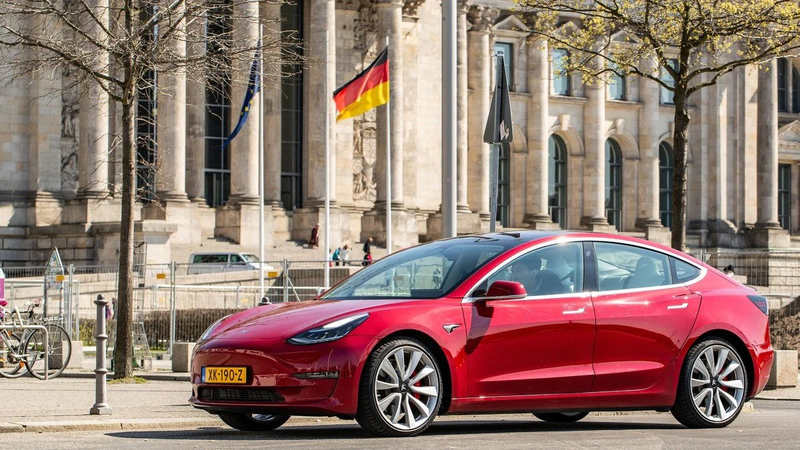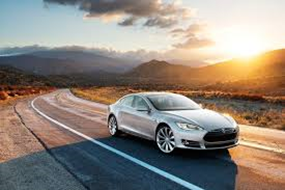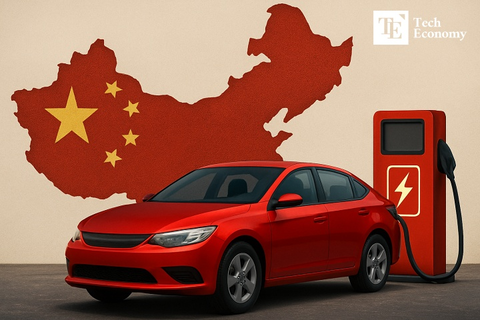Tesla Shares Fall 8% as Post-Election Surge Dissipates
Input
Modified
Tesla's Post-Election Struggles Tesla's Struggles in Europe The Road Ahead for Tesla: Challenges Beyond Europe

Tesla's Post-Election Struggles
Tesla's stock has recently taken a significant hit, with shares dropping 8%, a sharp contrast to the post-election surge it experienced just a few months ago. This decline in Tesla's valuation, which has seen a $1 trillion drop, is being driven by a combination of factors that are raising concerns among investors. While Tesla has long been one of the most innovative and valuable companies in the electric vehicle (EV) space, recent developments are causing people to question the future of the company. Among the concerns, Elon Musk’s political role and personal ventures, like his association with cryptocurrency, are drawing increasing scrutiny. On top of that, the company is facing intensifying competition, especially from Chinese electric vehicle manufacturer BYD, which is making significant inroads into Tesla’s once-dominant European market.
Following the recent election, many investors had high hopes that favorable policies for green technology would benefit electric vehicle manufacturers like Tesla. Initially, Tesla’s stock saw a bump as a reaction to the political landscape shifting in favor of clean energy initiatives. However, that optimism has faded, and the company's stock price has dropped, reflecting the growing challenges Tesla faces in both leadership and market competition.
One of the key factors contributing to Tesla’s stock decline is the increasing concern over Elon Musk’s leadership and personal interests. Musk has become more vocal about his political stances, particularly in relation to his support for certain political candidates and his outspoken presence on social media. Additionally, Musk’s involvement in cryptocurrencies, particularly with Dogecoin, has raised further questions about how his outside ventures could affect Tesla’s core business. Tesla investors are beginning to worry that Musk's personal and political engagements may distract him from focusing on the company’s growth and long-term goals, potentially undermining its value.
Moreover, Musk's behavior on social media and public forums has, at times, sparked controversy, leading some investors to question the company's ability to maintain a positive public image. Tesla's brand has long been associated with innovation and cutting-edge technology, but in recent months, Musk’s unfiltered comments have drawn negative attention. Whether this will have a lasting impact on the brand’s reputation remains to be seen, but it’s clear that Tesla's leadership is under increased scrutiny.
Musk’s political involvement has raised eyebrows, especially after his vocal support for candidates and causes that not all Tesla investors may agree with. His comments have at times sparked divisive debates, leading some investors to wonder whether Musk’s political beliefs are interfering with his ability to lead Tesla in the right direction. Musk’s high-profile nature has always been part of the Tesla brand, but as the company’s influence continues to grow, so does the scrutiny on its CEO’s actions outside of the EV world.
Moreover, Musk’s role in the cryptocurrency world, particularly his promotion of Dogecoin, has also caused concern. While his enthusiasm for Dogecoin and other digital currencies has garnered a large following, it has also led to volatility in the markets. As Tesla continues to be associated with Musk’s various ventures, it’s increasingly difficult for investors to separate the success of the company from the unpredictable actions of its CEO. The connection between Musk’s outside activities and Tesla’s business operations has some shareholders wondering whether Tesla is being distracted from its core mission of producing high-quality electric vehicles.
This distraction has implications not only for Tesla's stock price but also for the company's overall strategic direction. While Musk’s ventures have generated immense public interest, they may also divert resources and attention from Tesla's core strengths, such as advancing EV technology and manufacturing efficiencies. Investors are beginning to ask whether Musk’s external activities are at odds with Tesla's long-term vision.

Tesla's Struggles in Europe
Beyond concerns over Musk’s leadership, Tesla is facing a downturn in one of its most important markets: Europe. The company has seen a sharp decline in its sales in Europe, with some reports suggesting a nearly 50% drop in sales at the beginning of 2025. This marks a significant shift for Tesla, which has traditionally been one of the top-selling EV brands in the region.
The drop in sales can be attributed to several factors, including increased competition, changing consumer preferences, and challenges with production and distribution. Tesla’s vehicles, while still popular, are increasingly viewed as being too expensive for many European consumers, particularly as cheaper alternatives flood the market. The company’s premium pricing strategy, while successful in the past, is becoming less appealing as more affordable electric vehicles offer similar features at a fraction of the cost.
Furthermore, Tesla has faced logistical and production delays in Europe, which have compounded its sales struggles. The company’s ability to produce vehicles in Europe is crucial for meeting local demand, especially as competition heats up from European automakers like Volkswagen, as well as from new entrants like BYD. Tesla’s production delays have left many consumers waiting longer for their vehicles, giving competitors the opportunity to capture market share during these gaps.
One of the biggest threats to Tesla’s market share in Europe is the rapid growth of Chinese automaker BYD. In recent years, BYD has aggressively expanded into European markets, offering a range of affordable electric vehicles that are quickly gaining popularity. Unlike Tesla, which has positioned itself as a luxury brand, BYD has targeted the mass market with vehicles that are priced significantly lower.
BYD’s vehicles are gaining traction with European consumers who are looking for cost-effective alternatives to Tesla’s higher-priced models. The company has been able to keep production costs low, thanks to economies of scale in China, while offering vehicles that still meet European standards for quality and performance. As a result, BYD has quickly become a strong contender in the European electric vehicle market, forcing Tesla to rethink its pricing and marketing strategies.
Additionally, BYD’s ability to rapidly ramp up production and establish a local manufacturing presence in Europe gives the company an edge over Tesla. As the demand for affordable electric vehicles grows across the continent, BYD is well-positioned to capture a large share of the market, further eroding Tesla’s dominance in the region.
BYD’s success is also tied to the company's commitment to vertical integration, with a large portion of its components, including batteries, being sourced in-house. This allows BYD to control its supply chain and further reduce costs, providing it with a competitive edge in terms of pricing flexibility. As Tesla struggles to manage its supply chain in Europe and adjust to rising costs, BYD is positioning itself as a more viable option for price-conscious consumers.
As competition in the European market intensifies, Tesla is facing increasing pressure to adapt. In response to the rise of BYD and other competitors, Tesla has been working to reduce production costs and improve its supply chain. The company is also exploring new strategies to make its vehicles more affordable, including plans to introduce a more budget-friendly model aimed at competing with the likes of BYD.
However, the road ahead for Tesla is far from easy. The company's leadership will need to find ways to differentiate its products and create value beyond just offering a premium EV. Tesla's reputation for innovation, particularly in autonomous driving and battery technology, will need to be leveraged to stay ahead of competitors like BYD, which are rapidly catching up in terms of technology and production capabilities.
Tesla is also looking to expand into new markets, including India and Southeast Asia, where the demand for electric vehicles is expected to grow rapidly. If Tesla can establish a strong presence in these emerging markets, it could offset some of its losses in Europe. However, the competition in these regions is likely to be fierce, with both local and international automakers vying for market share.
Tesla's success in these new markets will depend not only on its ability to offer competitive prices but also on its ability to scale its operations quickly and effectively. As the company expands into new regions, it will need to overcome logistical challenges, adapt to local regulatory environments, and cater to the unique demands of consumers in these fast-growing markets.

The Road Ahead for Tesla: Challenges Beyond Europe
Tesla’s challenges aren’t limited to Europe. The company is also facing growing competition in its home market, the United States, where traditional automakers like Ford and General Motors are ramping up their EV production. These companies have the advantage of established brand loyalty and extensive dealer networks, which could make it difficult for Tesla to maintain its market leadership.
In addition, Tesla is encountering increasing regulatory scrutiny in several countries, particularly around issues related to autonomous driving technology and safety. As the company expands into new regions, it will need to navigate a complex web of regulations, which could pose challenges to its rapid growth.
Despite the challenges Tesla faces, it is not yet clear whether these difficulties will ultimately erode the company’s long-term prospects. Tesla remains a leader in the electric vehicle market, and its focus on innovation and cutting-edge technology gives it an edge over many competitors. The company is also continuing to invest heavily in its battery technology and autonomous driving systems, which could help it stay ahead of the competition in the years to come.
However, the recent stock decline and the increasing pressure from competitors like BYD serve as a reminder that Tesla’s market dominance is not guaranteed. If the company cannot respond to growing competition, manage Musk’s external ventures more effectively, and adapt to shifting consumer preferences, it could struggle to maintain its position at the forefront of the electric vehicle revolution.
Tesla's recent stock drop is a reflection of the broader challenges the company faces as it grapples with increased competition, leadership concerns, and market dynamics. While the company remains a key player in the EV market, the rise of companies like BYD and the growing scrutiny of Elon Musk’s personal ventures signal that Tesla’s future is far from certain. Investors and analysts will need to closely monitor the company's ability to adapt to these challenges and maintain its innovation-driven edge if it hopes to remain a leader in the rapidly evolving electric vehicle market.





















